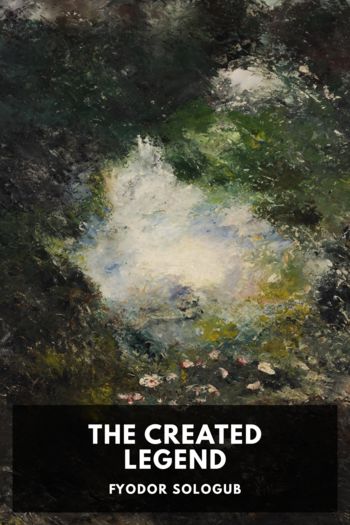Short Fiction - Gustave Flaubert (best free e reader .TXT) 📗

- Author: Gustave Flaubert
Book online «Short Fiction - Gustave Flaubert (best free e reader .TXT) 📗». Author Gustave Flaubert
The little lantern burned in front of him. Sometimes birds fluttered past it and obscured the light. But he could distinguish the eyes of the leper who stood at the stern, as motionless as a column.
And the trip lasted a long, long time.
When they reached the hut, Julian closed the door and saw the man sit down on the stool. The species of shroud that was wrapped around him had fallen below his loins, and his shoulders and chest and lean arms were hidden under blotches of scaly pustules. Enormous wrinkles crossed his forehead. Like a skeleton, he had a hole instead of a nose, and from his bluish lips came breath which was fetid and as thick as mist.
“I am hungry,” he said.
Julian set before him what he had, a piece of pork and some crusts of coarse bread.
After he had devoured them, the table, the bowl, and the handle of the knife bore the same scales that covered his body.
Then he said: “I thirst!”
Julian fetched his jug of water and when he lifted it, he smelled an aroma that dilated his nostrils and filled his heart with gladness. It was wine; what a boon! but the leper stretched out his arm and emptied the jug at one draught.
Then he said: “I am cold!”
Julian ignited a bundle of ferns that lay in the middle of the hut. The leper approached the fire and, resting on his heels, began to warm himself; his whole frame shook and he was failing visibly; his eyes grew dull, his sores began to break, and in a faint voice he whispered:
“Thy bed!”
Julian helped him gently to it, and even laid the sail of his boat over him to keep him warm.
The leper tossed and moaned. The corners of his mouth were drawn up over his teeth; an accelerated death-rattle shook his chest and with each one of his aspirations, his stomach touched his spine. At last, he closed his eyes.
“I feel as if ice were in my bones! Lay thyself beside me!” he commanded. Julian took off his garments; and then, as naked as on the day he was born, he got into the bed; against his thigh he could feel the skin of the leper, and it was colder than a serpent and as rough as a file.
He tried to encourage the leper, but he only whispered:
“Oh! I am about to die! Come closer to me and warm me! Not with thy hands! No! with thy whole body.”
So Julian stretched himself out upon the leper, lay on him, lips to lips, chest to chest.
Then the leper clasped him close and presently his eyes shone like stars; his hair lengthened into sunbeams; the breath of his nostrils had the scent of roses; a cloud of incense rose from the hearth, and the waters began to murmur harmoniously; an abundance of bliss, a superhuman joy, filled the soul of the swooning Julian, while he who clasped him to his breast grew and grew until his head and his feet touched the opposite walls of the cabin. The roof flew up in the air, disclosing the heavens, and Julian ascended into infinity face to face with our Lord Jesus Christ, who bore him straight to heaven.
And this is the story of Saint Julian the Hospitaller, as it is given on the stained-glass window of a church in my birthplace.
A Simple Soul I FélicitéFor half a century the housewives of Pont-l’Evêque had envied Madame Aubain her servant Félicité.
For a hundred francs a year, she cooked and did the housework, washed, ironed, mended, harnessed the horse, fattened the poultry, made the butter and remained faithful to her mistress—although the latter was by no means an agreeable person.
Madame Aubain had married a comely youth without any money, who died in the beginning of 1809, leaving her with two young children and a number of debts. She sold all her property excepting the farm of Toucques and the farm of Geffosses, the income of which barely amounted to 5,000 francs; then she left her house in Saint-Melaine, and moved into a less pretentious one which had belonged to her ancestors and stood back of the marketplace. This house, with its slate-covered roof, was built between a passageway and a narrow street that led to the river. The interior was so unevenly graded that it caused people to stumble. A narrow hall separated the kitchen from the parlour, where Madame Aubain sat all day in a straw armchair near the window. Eight mahogany chairs stood in a row against the white wainscoting. An old piano, standing beneath a barometer, was covered with a pyramid of old books and boxes. On either side of the yellow marble mantelpiece, in Louis XV style, stood a tapestry armchair. The clock represented a temple of Vesta; and the whole room smelled musty, as it was on a lower level than the garden.
On the first floor was Madame’s bedchamber, a large room papered in a flowered design and containing the portrait of Monsieur dressed in the costume of a dandy. It communicated with a smaller room, in which there were two little cribs, without any mattresses. Next, came the parlour (always closed), filled with furniture covered with sheets. Then a hall, which led to the study, where books and papers were piled on the shelves of a bookcase that enclosed three quarters of the big black desk. Two panels were entirely hidden under pen-and-ink sketches, Gouache





Comments (0)